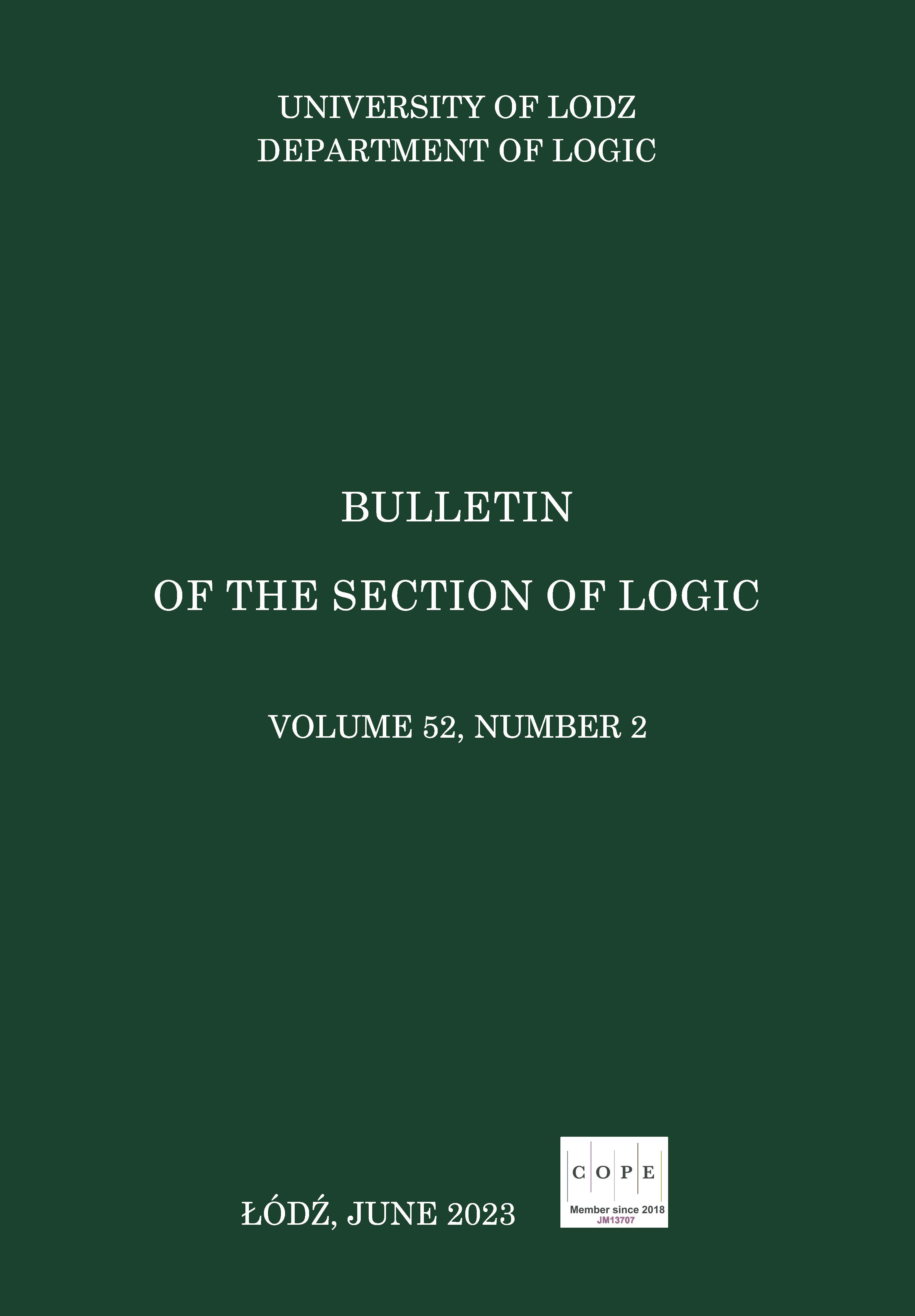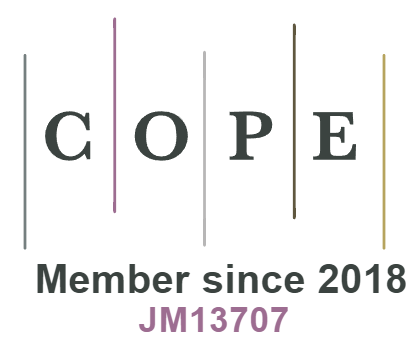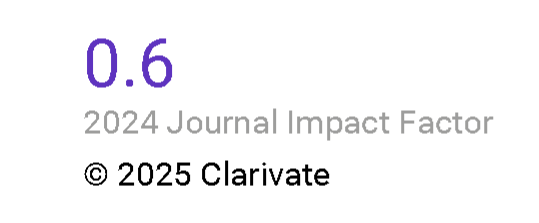On Synonymy in Proof-Theoretic Semantics: The Case of \(\mathtt{2Int}\)
DOI:
https://doi.org/10.18778/0138-0680.2023.18Keywords:
bilateralism, bi-intuitionistic logic \(\mathtt{2Int}\), cut-elimination, identity of derivations, synonymyAbstract
We consider an approach to propositional synonymy in proof-theoretic semantics that is defined with respect to a bilateral G3-style sequent calculus \(\mathtt{SC2Int}\) for the bi-intuitionistic logic \(\mathtt{2Int}\). A distinctive feature of \(\mathtt{SC2Int}\) is that it makes use of two kind of sequents, one representing proofs, the other representing refutations. The structural rules of \(\mathtt{SC2Int}\), in particular its cut rules, are shown to be admissible. Next, interaction rules are defined that allow transitions from proofs to refutations, and vice versa, mediated through two different negation connectives, the well-known implies-falsity negation and the less well-known coimplies-truth negation of \(\mathtt{2Int}\). By assuming that the interaction rules have no impact on the identity of derivations, the concept of inherited identity between derivations in \(\mathtt{SC2Int}\) is introduced and the notions of positive and negative synonymy of formulas are defined. Several examples are given of distinct formulas that are either positively or negatively synonymous. It is conjectured that the two conditions cannot be satisfied simultaneously.
References
A. Almukdad, D. Nelson, Constructible falsity and inexact predicates, The Journal of Symbolic Logic, vol. 49 (1984), pp. 231–233, DOI: https://doi.org/10.2307/2274105
Google Scholar
DOI: https://doi.org/10.2307/2274105
S. Ayhan, Meaning and identity of proofs in a bilateralist setting: A two-sorted typed lambda-calculus for proofs and refutations, manuscript in preparation.
Google Scholar
S. Ayhan, Uniqueness of Logical Connectives in a Bilateralist Setting, [in:] M. Blicha, I. Sedlár (eds.), The Logica Yearbook 2020, College Publications, London (2021), pp. 1–16.
Google Scholar
S. Drobyshevich, A bilateral Hilbert-style investigation of 2-intuitionistic logic, Journal of Logic and Computation, vol. 29(5) (2019), pp. 665–692, DOI: https://doi.org/10.1093/logcom/exz010
Google Scholar
DOI: https://doi.org/10.1093/logcom/exz010
S. Drobyshevich, S. Odintsov, H. Wansing, Moisil’s modal logic and related systems, [in:] K. Bimbó (ed.), Essays in Honour of Michael Dunn, College Publications, London (2022), pp. 150–177.
Google Scholar
R. Goré, Dual Intuitionistic Logic Revisited, [in:] R. Dyckhoff (ed.), Automated Reasoning with Analytic Tableaux and Related Methods. TABLEAUX 2000, Springer-Verlag, Berlin (2000), pp. 252–267, DOI: https://doi.org/10.1007/10722086_21
Google Scholar
DOI: https://doi.org/10.1007/10722086_21
N. Kamide, H. Wansing, Proof theory of Nelson’s paraconsistent logic: A uniform perspective, Theoretical Computer Science, vol. 415 (2012), pp. 1–38, DOI: https://doi.org/10.1016/j.tcs.2011.11.001
Google Scholar
DOI: https://doi.org/10.1016/j.tcs.2011.11.001
N. Kamide, H. Wansing, Proof Theory of N4-related paraconsistent logics, College Publications, London (2015).
Google Scholar
T. Kowalski, H. Ono, Analytic cut and interpolation for bi-intuitionistic logic, The Review of Symbolic Logic, vol. 10(2) (2017), pp. 259–283, DOI: https://doi.org/10.1017/S175502031600040X
Google Scholar
DOI: https://doi.org/10.1017/S175502031600040X
S. Negri, J. von Plato, Structural proof theory, Cambridge University Press, Cambridge/New York (2001), DOI: https://doi.org/10.1017/CBO9780511527340
Google Scholar
DOI: https://doi.org/10.1017/CBO9780511527340
L. Postniece, Proof Theory and Proof Search of Bi-Intuitionistic and Tense Logic, Ph.D. thesis, The Australian National University, Canberra (2010).
Google Scholar
D. Prawitz, Natural Deduction: A Proof-Theoretical Study, Almqvist & Wiksell, Stockholm (1965).
Google Scholar
C. Rauszer, A formalization of the propositional calculus of H-B logic, Studia Logica, vol. 33(1) (1974), pp. 23–34, DOI: https://doi.org/10.1007/BF02120864
Google Scholar
DOI: https://doi.org/10.1007/BF02120864
F. von Kutschera, Ein verallgemeinerter Widerlegungsbegriff für Gentzenkalküle, Archiv für mathematische Logik und Grundlagenforschung, vol. 12 (1969), pp. 104–118, DOI: https://doi.org/10.1007/BF01969697
Google Scholar
DOI: https://doi.org/10.1007/BF01969697
H. Wansing, Falsification, natural deduction and bi-intuitionistic logic, Journal of Logic and Computation, vol. 26(1) (2016), pp. 425–450, DOI: https://doi.org/10.1093/logcom/ext035
Google Scholar
DOI: https://doi.org/10.1093/logcom/ext035
H. Wansing, On Split Negation, Strong Negation, Information, Falsification, and Verification, [in:] K. Bimbó (ed.), J. Michael Dunn on Information Based Logics. Outstanding Contributions to Logic, vol. 8, Springer (2016), pp. 161–189, DOI: https://doi.org/10.1007/978-3-319-29300-4_10
Google Scholar
DOI: https://doi.org/10.1007/978-3-319-29300-4_10
H. Wansing, A more general general proof theory, Journal of Applied Logic, vol. 25 (2017), pp. 23–46, DOI: https://doi.org/10.1016/j.jal.2017.01.002
Google Scholar
DOI: https://doi.org/10.1016/j.jal.2017.01.002
H. Wansing, A note on synonymy in proof-theoretic semantics, [in:] T. Piecha, K. Wehmeier (eds.), Peter Schroeder-Heister on Proof-Theoretic Semantics. Outstanding Contributions to Logic, Springer (forthcoming).
Google Scholar
H. Wansing, S. Ayhan, Logical multilateralism (2023), submitted.
Google Scholar
DOI: https://doi.org/10.1007/s10992-023-09720-9
Downloads
Published
How to Cite
Issue
Section
License

This work is licensed under a Creative Commons Attribution-NonCommercial-NoDerivatives 4.0 International License.















